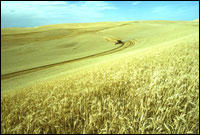Not for the Faint of Heart

I have recently read an article entitled "The Oil We Eat" from the July 23, 2004 issue of Harper's Magazine. It is by Richard Manning, an environmental journalist and author. The article traces the origins of our food staples (corn, wheat, rice), and assesses them in terms of the fossil fuels used in production and distribution. It is truly shocking. You will not find optimism in this article. The primary problem appears to be the use of these grains (namely corn and wheat) to feed livestock intended for consumption as meat. But Manning is condemning agriculture itself, asserting that farming originated as a means of accumulating wealth, not simply as a method of creating a surplus of food. I thought this premise bizarre - as farmers are not (and never have been) wealthy individuals - but he is addressing a larger issue. I suggest you read the article. I may at some point read his book on the subject as well, although I felt such despair after reading this article that's it's hard to sign up for more of the same. I'd like to hear your thoughts. The article is quite dense with information, though certainly blatant in tone. I found I had to go back and read certain passages over and over.
I have abstained from eating meat for the last few months, except for exceptions where I knew the animals were allowed free roam and were not treated with hormones or antibiotics. I'd prefer that they were also fed with organic grain. Consequently, I'm not eating much meat. I don't miss it at all. The more I read and learn, the more it sounds like meat consumption is not a healthy choice for an environmentalist.
In other news, here's a great environmental news organization for journalists ... I think it functions as kind of an Associated Press for issues related to the environment and public health. I discovered it searching for information on the Million Solar Roofs bill in California, which proposes to increase the market for solar energy by "facilitat[ing] the sale and installation of one million solar roofs by 2010." Naturally, we must ask what kind of environmental impact comes from the production and installation of these roofs ... but I would hope it's been weighed favorably against the fuel saved via electricity conservation. I can't seem to find whether this bill has officially passed its last hurdle, although someone on the craigslist ecology forum said it died in the last vote. I can't confirm it yet.
We must keep asking questions and hearing difficult answers. The situation is dire, and without these painful realizations there will be no progress. I'm not ready to throw up my hands and wait out the catastrophes. The planet has miraculous staying power considering what it has already suffered ... but this power is finite, and greed and ignorance comprise a formidable adversary. Learn and do what you can.


0 Comments:
Post a Comment
<< Home